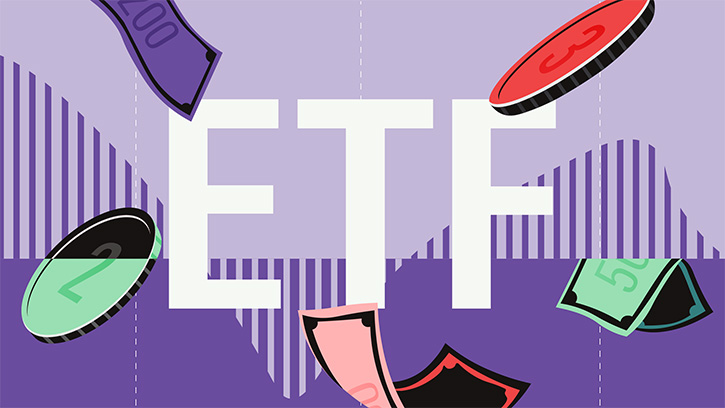
Exchange-traded funds, or ETFs, are often low-cost instruments for investors to track popular indexes or leverage experienced manager choices in an attempt to beat the market. The best ones serve as building blocks for a portfolio, and unlike open-end mutual funds, all ETFs are traded throughout the day on an exchange.
In the first quarter of 2024, the top-performing ETFs included equity technology funds Amundi MSCI Semiconductors ESG Screened UCITS ETF (CHIP) and VanEck Semiconductor UCITS ETF (SMH). The worst performers included VanEck Rare Earth and Strategic Metals UCITS ETF (REMX) and Invesco Solar Energy UCITS ETF (ISUN). Data in this article is sourced from Morningstar Direct.
To find the quarter's best- and worst-performing ETFs, we screened those in Morningstar's equity, allocation, or fixed-income categories that are available in the UK. We excluded exchange-traded notes, known as ETNs, and ETFs with less than $25 million (£19.9 million) in total assets. We also excluded funds that fall into Morningstar's "trading" categories, as these funds are designed for active traders and are not suitable for long-term investors.
Returns for the best- and worst-performing ETFs ranged from 34.9% to negative 16.7%, a gap of 51.6 percentage points.
The 10 Best-Performing ETFs for Q1 2024
1. Amundi MSCI Semiconductors ESG Screened UCITS ETF (CHIP)
2. VanEck Semiconductor UCITS ETF (SMH)
3. VanEck Defense ETF (DFNS)
4. iShares Edge MSCI USA Momentum Factor UCITS ETF (IUMO)
5. HSBC NASDAQ Global Semiconductor UCITS ETF (HNSS)
6. Xtrackers MSCI World Momentum UCITS ETF (XDEM)
7. iShares Edge MSCI World Momentum Factor UCITS ETF (IWMO)
8. Invesco CoinShares Global Blockchain UCITS ETF (BCHN)
9. iShares MSCI Global Semiconductors UCITS ETF (SEMI)
10. Invesco Dow Jones US Insurance UCITS ETF (INSU)
The 10 Worst-Performing ETFs for Q1 2024
1. VanEck Rare Earth and Strategic Metals UCITS ETF (REMX)
2. Invesco Solar Energy UCITS ETF (ISUN)
3. Global X Lithium & Battery Tech UCITS ETF (LITU)
4. Invesco Markets II PLC - Invesco Global Clean Energy UCITS ETF (GCLE)
5. iShares Global Clean Energy UCITS ETF (INRG)
6. Xtrackers MSCI Thailand UCITS ETF (XCS4)
7. iShares MSCI Brazil UCITS ETF USD (Dist) (IBZL)
8. Amundi MSCI China Tech ESG Screened UCITS ETF (CC1)
9. Amundi MSCI Brazil UCITS ETF (RIO)
10. iShares MSCI Brazil UCITS ETF (DE) (4BRZ)
Metrics for the Best-Performing ETFs
Amundi MSCI Semiconductors ESG Screened UCITS ETF
• Morningstar Rating: N/A
• Expense Ratio: 0.45%
• Morningstar Category: Equity Technology
The £346 million Amundi MSCI Semiconductors ESG Screened UCITS ETF was the best-performing ETF in the first quarter, with a 34.9% return. The return on the passively managed Amundi ETF topped the 8.5% gain on the average fund in Morningstar’s equity technology category for the quarter. Over the last 12 months, the Amundi MSCI Semiconductors ESG Screened UCITS ETF has returned 77%, outperforming the 25.6% gain on the average fund in its category, leaving the ETF in the 2nd percentile.
The Amundi MSCI Semiconductors ESG Screened UCITS ETF takes environmental, social, and governance criteria into consideration. This fund has a Morningstar Medalist Rating of Silver.
VanEck Semiconductor UCITS ETF
• Morningstar Rating: 5 stars
• Expense Ratio: 0.35%
• Morningstar Category: Equity Technology
The second-best performing ETF in the first quarter was the £1.4 billion VanEck Semiconductor UCITS ETF. The passively managed VanEck ETF returned 23.8%, outperforming the average equity technology fund, which gained 8.5%. Looking back over the last 12 months, the VanEck Semiconductor UCITS ETF has returned 60.3%, outperforming the 25.6% return on the average fund in its category, leaving the ETF in the 4th percentile.
The Silver-rated VanEck Semiconductor UCITS ETF was launched in December 2020.
VanEck Defense ETF
• Morningstar Rating: N/A
• Expense Ratio: 0.55%
• Morningstar Category: Equity Industrial Materials
The £389 million VanEck Defense ETF ranked third for the quarter, returning 22.5%. The VanEck ETF, which is passively managed, topped the 5.6% average return on funds in the equity industrial materials category for the first quarter. The fund was first launched in March 2023, and as a result, it does not have a one-year track record.
The VanEck Defense ETF has a Morningstar Medalist Rating of Bronze.
iShares Edge MSCI USA Momentum Factor UCITS ETF
• Morningstar Rating: 2 stars
• Expense Ratio: 0.20%
• Morningstar Category: US Large-Cap Growth Equity
With a 21.3% return, the £282 million iShares Edge MSCI USA Momentum Factor UCITS ETF ranked fourth in the quarter. The passively managed iShares ETF outperformed the 11.7% return on the average US large-cap-cap growth equity fund. Over the last 12 months, the fund has gained 34.1%, ahead of the 31.1% return on funds in its category, placing it in the 41st percentile for the period.
The iShares Edge MSCI USA Momentum Factor UCITS ETF has a Silver Morningstar Medalist Rating. It was launched in October 2016.
HSBC NASDAQ Global Semiconductor UCITS ETF
• Morningstar Rating: N/A
• Expense Ratio: 0.35%
• Morningstar Category: Equity Technology
The fifth-best performing ETF was the £29 million HSBC NASDAQ Global Semiconductor UCITS ETF, which gained 21.3% in the first quarter. This passively managed HSBC ETF beat the 8.5% average return on funds in the equity technology category. Over the past year, the HSBC NASDAQ Global Semiconductor UCITS ETF rose 54.4%, outperforming the 25.6% return on the average fund in its category and placing it in the 5th percentile.
The HSBC NASDAQ Global Semiconductor UCITS ETF, launched in January 2022, has a Morningstar Medalist Rating of Bronze.
Xtrackers MSCI World Momentum UCITS ETF
• Morningstar Rating: 4 stars
• Expense Ratio: 0.15%
• Morningstar Category: Global Large-Cap Growth Equity
The £1 billion Xtrackers MSCI World Momentum UCITS ETF was the sixth-best performing UK ETF in the first quarter, with a 21% return. The return on the passively managed Xtrackers ETF topped the 9.1% gain on the average fund in Morningstar’s global large-cap growth equity category. Looking back over the last 12 months, the Xtrackers MSCI World Momentum UCITS ETF has returned 32.8%, outperforming the 19.3% return on the average fund in its category, leaving the ETF in the 5th percentile.
The Gold-rated Xtrackers MSCI World Momentum UCITS ETF was launched in September 2014.
iShares Edge MSCI World Momentum Factor UCITS ETF
• Morningstar Rating: 4 stars
• Expense Ratio: 0.30%
• Morningstar Category: Global Large-Cap Growth Equity
The seventh-best performing ETF in the first quarter was the £1.6 billion iShares Edge MSCI World Momentum Factor UCITS ETF. The passively managed iShares ETF returned 21%, outperforming the average global large-cap growth equity fund, which gained 9.1%. Looking back over the last 12 months, the iShares Edge MSCI World Momentum Factor UCITS ETF has returned 32.7%, outperforming the 19.3% return on the average fund in its category, leaving the ETF in the 6th percentile.
The iShares Edge MSCI World Momentum Factor UCITS ETF has a Morningstar Medalist Rating of Gold. It was launched in October 2014.
Invesco CoinShares Global Blockchain UCITS ETF
• Morningstar Rating: 1 star
• Expense Ratio: 0.65%
• Morningstar Category: Equity Technology
The £561 million Invesco CoinShares Global Blockchain UCITS ETF ranked eighth for the quarter, returning 20.7%. The Invesco ETF, which is passively managed, topped the 8.5% average gain on funds in the equity technology category. Over the last 12 months, the Invesco ETF has returned 61.5%, ahead of the 25.6% return on the average fund in its category, leaving it in the 4th percentile for performance.
The Bronze-rated Invesco CoinShares Global Blockchain UCITS ETF was launched in March 2019.
iShares MSCI Global Semiconductors UCITS ETF
• Morningstar Rating: N/A
• Expense Ratio: 0.35%
• Morningstar Category: Equity Technology
With a 19.6% gain, the £886 million iShares MSCI Global Semiconductors UCITS ETF ranked ninth in the first quarter. The passively managed iShares ETF outperformed the 8.5% return on the average equity technology fund. Over the last 12 months, the fund has returned 49.5%, ahead of the 25.6% return on funds in its category, placing it in the 8th percentile.
The iShares MSCI Global Semiconductors UCITS ETF, launched in August 2021, has a Morningstar Medalist Rating of Gold.
Invesco Dow Jones US Insurance UCITS ETF
• Morningstar Rating: N/A
• Expense Ratio: 0.35%
• Morningstar Category: Equity Financial Services
The tenth-best performing ETF was the £165 million Invesco Dow Jones US Insurance UCITS ETF, which gained 18.5% in the first quarter. The passively managed Invesco ETF beat the 9.3% average return on funds in the equity financial services category. The fund was first launched in July 2023, and as a result, it does not have a one-year track record.
The Invesco Dow Jones US Insurance UCITS ETF has a Morningstar Medalist Rating of Bronze.
Metrics for the Worst-Performing ETFs
VanEck Rare Earth and Strategic Metals UCITS ETF
• Morningstar Rating: N/A
• Expense Ratio: 0.59%
• Morningstar Category: Equity Precious Metals
The worst performing ETF in the first quarter was the £68 million VanEck Rare Earth and Strategic Metals UCITS ETF, which lost 16.7%. The passively managed VanEck ETF underperformed the average 0.3% gain on funds in the equity precious metals category in the first quarter. Over the past 12 months, the VanEck Rare Earth and Strategic Metals UCITS ETF fell 38.8%, placing it in the 100th percentile within its category and falling further than the 6.5% loss on the average fund.
The VanEck Rare Earth and Strategic Metals UCITS ETF, launched in September 2021, has a Morningstar Medalist Rating of Bronze.
Invesco Solar Energy UCITS ETF
• Morningstar Rating: N/A
• Expense Ratio: 0.69%
• Morningstar Category: Equity Alternative Energy
With a 14.6% loss, the £53 million Invesco Solar Energy UCITS ETF was the second-worst performing ETF on our list for the first quarter. The passively managed Invesco ETF fell further than the average 5.1% loss on funds in the equity alternative energy category. Over the past 12 months, the Invesco Solar Energy UCITS ETF lost 43%, placing it in the 100th percentile within its category and falling further than the 18.1% loss on the average fund.
The Neutral-rated Invesco Solar Energy UCITS ETF was launched in August 2021.
Global X Lithium & Battery Tech UCITS ETF
• Morningstar Rating: N/A
• Expense Ratio: 0.60%
• Morningstar Category: Equity Natural Resources
The third-worst performing ETF in the first quarter was the £27 million Global X Lithium & Battery Tech UCITS ETF, which fell 10.9%. The Global X ETF, which is passively managed, underperformed the average 1.3% gain on funds in the equity natural resources category. Over the past 12 months, the ETF fell 29.1% to place in the 98th percentile within its category, falling further than the category's average 1-year loss of 0.3%.
The Global X Lithium & Battery Tech UCITS ETF has a Morningstar Medalist Rating of Bronze. It was launched in December 2021.
Invesco Markets II PLC - Invesco Global Clean Energy UCITS ETF
• Morningstar Rating: N/A
• Expense Ratio: 0.60%
• Morningstar Category: Equity Alternative Energy
The £34 million Invesco Markets II PLC - Invesco Global Clean Energy UCITS ETF was the fourth-worst performing ETF in the first quarter, with a loss of 10.8%. The passively managed Invesco ETF performed worse than the average 5.1% loss on funds in the equity alternative energy category. Over the past year, the ETF dropped 28.5% to land in the 73rd percentile within its category, dropping further than the category's average one-year loss of 18.1%.
The Neutral-rated Invesco Markets II PLC - Invesco Global Clean Energy UCITS ETF was launched in March 2021.
iShares Global Clean Energy UCITS ETF
• Morningstar Rating: 2 stars
• Expense Ratio: 0.65%
• Morningstar Category: Equity Alternative Energy
Fifth-worst was the £2.6 billion iShares Global Clean Energy UCITS ETF, which lost 9.7% in the first quarter. The passively managed iShares ETF fell further than the average 5.1% decline on funds in the equity alternative energy category. Over the past year, the iShares Global Clean Energy UCITS ETF fell 30%, finishing in the 78th percentile within its category. It dropped further than the category's average one-year loss of 18.1%.
The iShares Global Clean Energy UCITS ETF has a Morningstar Medalist Rating of Silver. It was launched in July 2007.
Xtrackers MSCI Thailand UCITS ETF
• Morningstar Rating: 4 stars
• Expense Ratio: 0.25%
• Morningstar Category: Thailand Equity
The sixth-worst performing ETF in the first quarter was the £50 million Xtrackers MSCI Thailand UCITS ETF, which lost 8.2%. The passively managed Xtrackers ETF performed roughly in line with the average 7.3% loss on funds in the Thailand equity category. Over the past 12 months, the Xtrackers MSCI Thailand UCITS ETF fell 19.1%, placing it in the 75th percentile within its category and falling further than the 17.8% loss on the average fund.
The Xtrackers MSCI Thailand UCITS ETF has a Morningstar Medalist Rating of Bronze. It was launched in June 2010.
iShares MSCI Brazil UCITS ETF USD (Dist)
• Morningstar Rating: 3 stars
• Expense Ratio: 0.74%
• Morningstar Category: Brazil Equity
With a 7.1% loss, the £272 million iShares MSCI Brazil UCITS ETF USD (Dist) was the seventh-worst performing ETF on our list for the first quarter. The passively managed iShares ETF fell further than the average 5.8% loss on funds in the Brazil equity category. Over the past 12 months, the iShares MSCI Brazil UCITS ETF USD (Dist) gained 22.7%, placing it in the 56th percentile within its category and outperforming the 21% return on the average fund.
The iShares MSCI Brazil UCITS ETF USD (Dist), launched in November 2005, has a Morningstar Medalist Rating of Bronze.
Amundi MSCI China Tech ESG Screened UCITS ETF
• Morningstar Rating: 3 stars
• Expense Ratio: 0.55%
• Morningstar Category: China Equity
The eighth-worst performing ETF in the first quarter was the £48 million Amundi MSCI China Tech ESG Screened UCITS ETF, which fell 6.8%. The Amundi ETF, which is passively managed, fell further than the average 1.8% loss on funds in the China equity category. Over the past 12 months, the ETF fell 23.1% to place in the 71st percentile within its category, dropping further than the average one-year loss of 21.4%.
The Amundi MSCI China Tech ESG Screened UCITS ETF, launched in April 2018, has a Morningstar Medalist Rating of Neutral.
Amundi MSCI Brazil UCITS ETF
• Morningstar Rating: 4 stars
• Expense Ratio: 0.65%
• Morningstar Category: Brazil Equity
The £322 million Amundi MSCI Brazil UCITS ETF was the ninth-worst performing ETF in the first quarter, with a decline of 6.7%. The passively managed Amundi ETF performed roughly in line with the average 5.8% loss on funds in the Brazil equity category. Over the past year, the ETF gained 23.5% to land in the 44th percentile, outperforming the category's average one-year return of 21%.
The Amundi MSCI Brazil UCITS ETF has a Morningstar Medalist Rating of Bronze. It was launched in March 2019.
iShares MSCI Brazil UCITS ETF (DE)
• Morningstar Rating: 4 stars
• Expense Ratio: 0.25%
• Morningstar Category: Brazil Equity
Tenth-worst was the £2.4 billion iShares MSCI Brazil UCITS ETF (DE), which lost 6.6% in the first quarter. The passively managed iShares ETF performed roughly in line with the average 5.8% loss on funds in the Brazil equity category for the quarter. Over the past year, the iShares MSCI Brazil UCITS ETF (DE) rose 23.7%, finishing the 12-month period in the 28th percentile within the Brazil equity category. It outperformed the category's average one-year return of 21%.
The Gold-rated iShares MSCI Brazil UCITS ETF (DE) was launched in October 2018.
What Are ETFs?
Exchange-traded funds are investments that trade throughout the day on stock exchanges, much like individual stocks. They differ from traditional mutual funds – known as open-end funds – which can only be bought or sold at a single price each day. Historically, ETFs have tracked indexes, but in recent years, more ETFs have been actively managed. ETFs cover a range of asset classes, including stocks, bonds, commodities, and most recently cryptocurrency.
The Best ETFs: More Ideas to Consider
Investors who would like to find more of the top-performing or cheapest ETFs can do the following:
• Read the latest articles on ETFs.
• Use the ETF screener to find the best ETFs according to your specific criteria. You can search for funds based on their fees, Morningstar Medalist Ratings, manager tenures, and more.
• Compare funds and ETFs side by side and easily follow their valuations, ratings, and fees.
This article was compiled by Bella Albrecht, edited by Lauren Solberg, and reviewed by Sunniva Kolostyak.
As part of our mission to put more information into the hands of investors, this article was compiled from Morningstar’s data and independent research using automation technology. The original article was written by Morningstar reporters and editors. This updated version was reviewed by an editor.





















